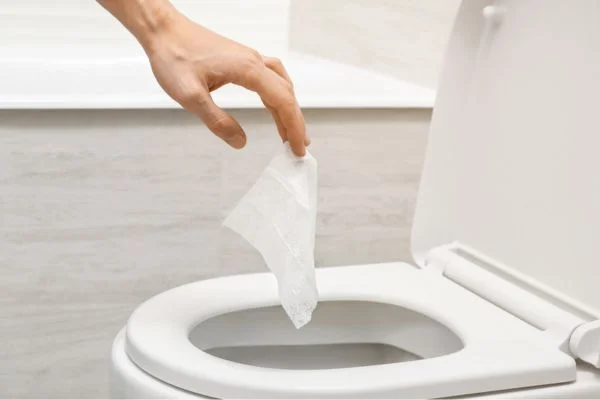It’s easy to forget that baby wipes are not like toilet paper, but it happens to the best of us. You might think you can flush baby wipes down the toilet with no harm done—but that’s not the case. Baby wipes don’t dissolve in water and can wreak havoc on your plumbing system. Let’s talk about What happens if you flush baby wipes and why you should never flush baby wipes?
The Problem With Flushing Baby Wipes
Baby wipes are made from a combination of materials, including plastic fibers, which do not break down in the water. While other “flushable” products (like toilet paper) will eventually degrade in water, baby wipes are designed to hold up against moisture and pressure.
This makes them particularly bad for your plumbing system because they tend to stick together and form clogs that block your pipes. And once a clog has started, it won’t go away until you take action.
What Happens When If You Flush Baby Wipes?
If you flush baby wipes down your toilet, you will soon start noticing problems. Your toilet may begin to back up or overflow more frequently than usual.
In extreme cases, the clog may travel further down your home’s sewer line and cause even more severe issues like overflowing toilets or drains throughout your house.
Not only is this incredibly inconvenient and unsanitary, but it can also be extremely costly to repair any damage done by a blocked pipe caused by flushing baby wipes.
Also Read: Are Baby Wipes Good For Your Face?
How Many Baby Wipes Will Clog A Toilet?
Have you ever wondered how many baby wipes it takes to clog a toilet? Well, let us tell you, it doesn’t take many. Unlike regular toilet paper that dissolves quickly in water, baby wipes are made of more robust materials and can take longer to break down.
This means that if flushed down the toilet, they can quickly build up and cause your pipes to become blocked. Trust us; you want to avoid the hassle and expense of unclogging your toilet.
So, to avoid potential problems. It’s best to dispose of baby wipes in the trash can instead of flushing them down the toilet. Your plumbing (and wallet) will thank you!
How Long Does It Take For Baby Wipes To Clog A Toilet?

Many people have experienced the hassle and frustration of a clogged toilet; unfortunately, baby wipes are often one of the main culprits. With more and more people turning to them out of convenience and ease, it just takes a few tossed in too many for disaster to strike.
Depending on what kind of pipes your home is equipped with, it can take anywhere from as little as a thrown-away wipe or two to several packs before your toilet is backed up so much that you have to call in a professional.
It all depends on how quickly the materials used in the wipes break down, but one thing is undeniable; baby wipes do an excellent job clogging plumbing systems when care isn’t taken.
Also Read: How To Treat Allergic Reaction To Baby Wipes?
Do Flushable Baby Wipes Dissolve?
Many parents today rely on baby wipes for their daily diaper-changing needs – but do these flushable wipes dissolve? The truth is that even if your package says “flushable” and has a satisfied septic tank symbol, the answer is not always a definitive yes.
Baby wipes can contain large amounts of plastic and other fiber materials, meaning they don’t always dissolve fully and can result in serious clogs further down the line.
Test a single wipe in water before flushing multiple times if you decide to flush them. Doing so will reduce your risk of clogs while giving you peace of mind that your pipes won’t be affected.
What Are Flushable Wipes?
Flushable wipes are wet wipes designed with unique materials that will break down when exposed to water and sewage. They can be used in a variety of ways, from body cleansing to makeup removal and more.
They come in different sizes and styles, including pre-moistened cloths, single-use packets, and even rolls that can be cut into smaller sizes.
Are All Wet Wipes Flushable?
No! Not all wet wipes are flushable. It’s essential to read the label before flushing any wipe down the toilet. Most non-flushable wet wipes will say “Do Not Flush” on the packaging.
These wet wipes should not be flushed because they do not break down in the water like flushable ones. They can clog your pipes or harm the environment if thrown away improperly.
Also Read: Are Baby Wipes Biodegradable?
How Do I Know Which Ones Are Flushable?
When it comes to knowing which products are flushable, the best way to determine is by reading the label beforehand. Many products now include labeling to alert consumers that a product is safe for flushing and won’t clog their toilets or pipes.
There may also be indications of good toilet paper ply or suggestions on whether or not the product should be placed into a trash bin instead; however, these can differ depending on the type of septic tank in use.
Note that tissue paper is always safe for flushing, but other things, such as flood pads, wipes, and Q-tips, should never be put down in any drains or toilets. Knowing which products are suitable to flush helps prevent things from getting stuck in pipes, so always check the labels before committing!
Bottom Line:
The bottom line of what happens if you flush baby wipes: don’t flush baby wipes! They don’t dissolve in water as toilet paper does and can cause significant problems with your plumbing system if they get stuck in pipes or drains.
Instead of flushing them away, put used baby wipes in the trash where they belong—your wallet (and your plumber) will thank you later!



